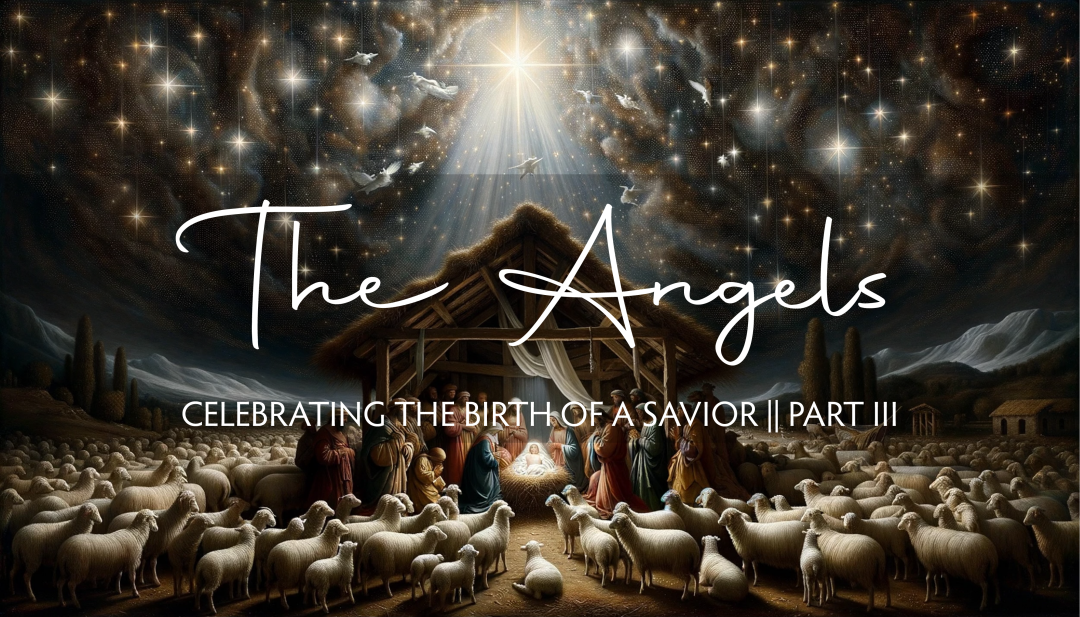
Angels we have heard on high,
Sweetly singing over the plans.
And the mountains in reply
Echoing their joyous strains.
We hear this song as we shop during the holiday season. We may exaggerate the chorus alone in our cars. We sing this song with others as we gather during the Christmas season. But like many songs, how often do we consider what we are singing about? What were these angels so joyous about?
Angels are God’s messengers. Throughout the Bible, we read how God sent angels to share His message with people. In the original language of the Bible, the same word is used for a human messenger and a divine messenger. A human messenger brought news of the birth of a son or a report from the battlefield, usually a victory won. The divine messengers in the Christmas account found in the Bible spread the good news of the birth of a son. The angel, or angels (we are not sure if the same angel visited the different people), gave this good news of a coming son to Zechariah, Mary, and Joseph. Zechariah was the father of John the Baptist and heard from an angel to expect a son before his wife became pregnant (Luke 1:5-25). Mary and Joseph received separate visits from an angel with the news that Mary would have a son (Luke 1:26-38; Matthew 1:18-25). The news of a son was always good news and something to celebrate. Yet, there was more good news in the message the angels shared.
Promised
From the beginning of time, God promised us someone who would deal with the Enemy, the Savior (Genesis 3:15). God also promised Abraham that his family would be a blessing to all people of the world (Genesis 12:1-3). The promise of an everlasting kingdom with one of David’s descendants sitting on the throne of that Kingdom. The angels revealed that Mary’s Son, Jesus, was the fulfillment of God’s promises.
When the angel spoke to the shepherds the angel called Jesus by the title Savior. (Luke 2:11). This title is filled with meaning to the shepherds. Every Jewish person was looking for a savior, someone to save them from their enemies, the nations that occupied their land and oppressed them. Throughout their history, they looked to many men to be this for them. The angels announce the arrival of this Savior to the shepherds. The angels also announce that this Savior would save the people from their sins (Matthew 1:21). Saving the people from their sin would require much more than saving a nation from their enemies.
To Mary, the angel announced that her child would fulfill another promise. In 2 Samuel, God made a promise to King David that his kingdom would go on forever. The angel tells Mary her Son would hold the throne of David and reign over the everlasting Kingdom (Luke 1:32-33). The angel said the child would be holy, which is to say, set apart for God. This implies that the Kingdom Jesus reigns over is also set apart for God. This Kingdom is not just a physical kingdom found in Israel, it would be a spiritual Kingdom allowing God rule and reign among people throughout the world.
Through the birth of Jesus God’s faithfulness is seen. Although the fulfillment of these promises comes hundreds, or thousands, of years after the promise was given, it is still worthy of a celebration. Glory to God in the Highest! The faithful One of Heaven!
Power
It is strange to think of a baby or a child having power. They are little and helpless. They are dependent on the adults around them for their very survival. Yet, the angels tell of this Child’s power.
The title Lord expresses power and authority. The title Lord was used by those who esteemed another as more powerful or possessing more authority than they did. The angel tells the shepherds that the baby they find wrapped in swaddling clothes and lying in a manger would be their Lord. Since the message is coming from an angel, the shepherds understood the baby’s power and authority was given by God. This child had ultimate power and authority.
When Gabriel visited Mary, the mother of Jesus, he announced that her child would be given the throne of David (Luke 1:32). This means this child would be the long-awaited King of Israel holding ultimate power in Israel and exerting power to defeat Israel against its enemies. The Israelites placed great hope in this promised king. They dreamed of a man who would free them from the nations that oppressed them and give them a name among the nations. The news of the birth of this king would be worthy of a grand celebration.
The new part was that this King would be called the Son of God (Luke 1:32, 35) because He would be conceived by the Holy Spirit (Matthew 1:20). This was an unexpected twist. All of Israel was looking for a man, a descendant of David. They did not expect this man to be Deity. In fact, this seemed impossible. Yet, the angels tell Mary, Joseph, and the shepherds that this is exactly what God has done. This news was too good for the angels to keep to themselves. God Himself in a human body! A miracle worth celebrating!
So, as the angel gave the shepherds the message of the birth of the Son of God, the Savior, who is Christ the Lord, the heavenly host could not contain themselves from breaking out in praise of the miracle that happened that night. God wrapped Himself in human flesh and came to His creation as a helpless babe. God entrusted the care of His Son to a teenage girl and ‘just a man’. Their job was to care for and raise the everlasting King.
The heavenly hosts praise God for fulfilling His promises and for the birth of a Son who is the King. The birth of this Child had far-reaching implications. The implications reach 2,000 years into the future and impact you and me in significant ways. The most significant is salvation. The Israelites were a bit shortsighted. They looked to the promised Savior to rescue their country. God intended His Son to recuse the world! Because of this miracle and the life, death, and resurrection of this King—because of this we live at peace with God. And like the people of Israel who lived before Jesus’ birth, we hope for the return of our King and the realization of the everlasting Kingdom. Our hearts should be overwhelmed with joy. We should sing with the heavenly hosts …
Gloria, in excelsis Deo! (Glory to God in the highest!)

